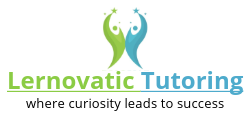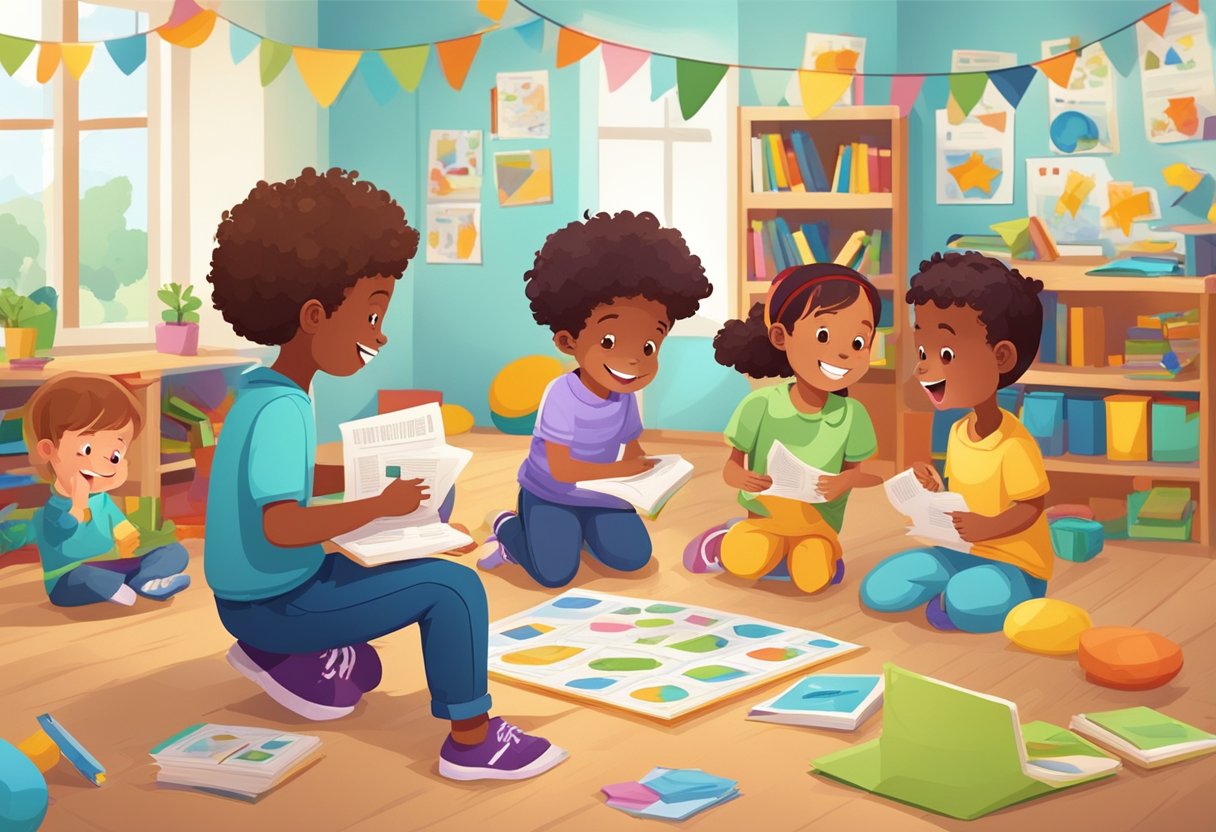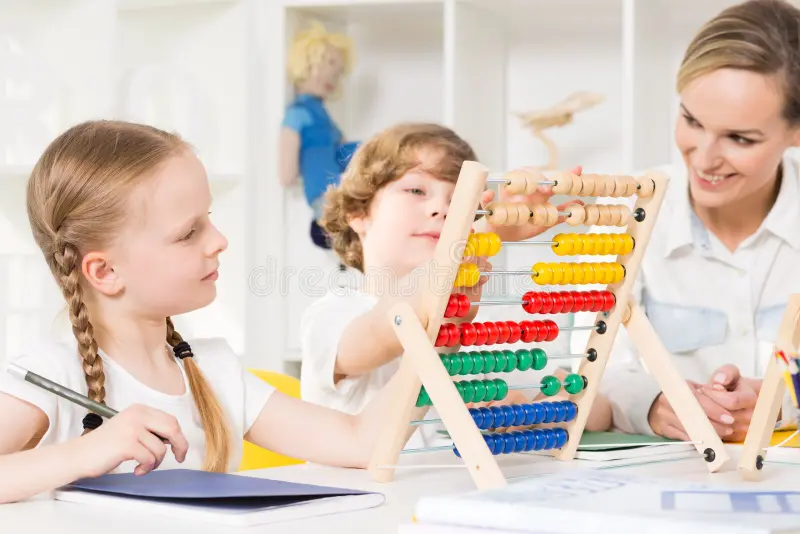
Junior Math Club
Unlocking Potential: Join Our Personalised Junior Math Club (Years 1 to 6)
Junior Math Mastery Starts Here!
Transform Your Skills: Discover Our Dynamic Junior Math Programme!
Our Junior Math programme provides

Games Galore
Play exciting maths games, solve puzzles, and participate in hands-on activities that bring learning to life.
Number Bingo:
Create bingo cards with numbers up to 100, tailoring the range to students' skill levels. Instead of calling out numbers, announce math problems (e.g., "5+3" for 8, "4x2" for 8). Players solve the problem mentally and mark off the answer on their cards if they have it. Encourage students to explain their solving strategies to promote mathematical communication. Vary problem types to include addition, subtraction, multiplication, and division for comprehensive practise.v
Multiplication War:
Play with a standard deck of cards, removing face cards (or assign them values of 10). Each player flips two cards simultaneously and multiplies the numbers. The player with the highest product wins all cards from that round. If there's a tie, players have a "war," flipping additional cards until one player wins. Keep score by counting cards at the end, or play until one player has all the cards, reinforcing multiplication facts throughout.
Pattern Block Puzzles:
Provide a set of pattern blocks (geometric shapes) and outline templates for students to fill. Start with simple outlines and progress to more complex shapes as students gain confidence. Encourage students to find multiple ways to fill each outline, promoting creative problem-solving. Discuss geometric properties of the blocks, such as angles and sides, as students work. Challenge students to create their own outline designs for classmates to solve, fostering deeper understanding of shape composition.
Fraction Pizza:
Provide paper circles representing pizzas and smaller coloured paper pieces for toppings. Give students fraction-based instructions for creating pizzas (e.g., "Make a pizza with 1/4 pepperoni, 1/2 cheese, and 1/4 mushrooms"). Students cut and arrange paper toppings to match the given fractions, visualising fractional parts. Use the pizzas to compare fractions, find equivalent fractions, and perform simple fraction addition and subtraction. Extend the activity by having students create their own fraction pizza recipes and exchange them with classmates.
Mastering Basics
Build a strong foundation in essential maths concepts through interactive exploration and engaging challenges.
Counting and Number Recognition:
Use colourful counters or objects to practise counting up to 100. Play "Number Hunt" to find and identify numbers in the environment. Create number lines with stickers or drawings to visualise number order. Sing counting songs and rhymes to reinforce number sequences. Use dot cards or ten frames to develop subitising skills and number sense.
Addition and Subtraction:
Use manipulatives like blocks or counters to physically represent addition and subtraction. Play board games that involve moving forward (adding) or backward (subtracting) spaces. Practise mental math with fun "fact family" challenges using numbers up to 20. Create simple word problems using everyday objects to apply addition and subtraction. Use number bonds to visualise part-whole relationships in addition and subtraction.
Shapes and Patterns:
Go on a "shape scavenger hunt" to identify 2D and 3D shapes in the environment. Create patterns using coloured blocks, beads, or stickers, then predict "what comes next". Play "Guess the Shape" by describing attributes like sides and corners. Use tangrams or pattern blocks to create pictures while exploring shape properties. Sort everyday objects by shape to reinforce recognition and classification skills.
Data Collection:
Conduct simple class surveys on favourite colours, pets, or foods. Create pictographs using stickers or drawings to represent survey results. Use sorting activities to group objects by various attributes (colour, size, shape). Make simple bar graphs using blocks or Lego to compare quantities. Play "Guess My Rule" to practise organising data based on different criteria.


Homework Help
Get expert support with school assignments and reinforce learning with practise from popular math books.
Basic Arithmetic:
Practise addition and subtraction facts using flashcards or online games. Learn multiplication tables through songs, rhymes, or skip counting activities. Use manipulatives like counters or base-10 blocks to visualise place value concepts. Solve word problems involving the four operations using real-life scenarios. Play "Math War" card game to reinforce quick mental calculations.
Fractions and Decimals:
Use fraction circles or bars to compare and order fractions visually. Practise equivalent fractions by folding paper strips or using fraction tiles. Convert between fractions and decimals using 10x10 grids or number lines. Solve simple fraction addition and subtraction problems using visual models. Explore decimal place value using money or metric measurement examples.
Measurement:
Estimate and measure lengths of everyday objects using standard and non-standard units. Practise telling time with both analog and digital clock models. Use kitchen scales to weigh ingredients, reinforcing mass measurement concepts. Measure liquid volumes using graduated cylinders or measuring cups in cooking activities. Create a personal timeline to understand and calculate elapsed time.
Geometry:
Identify and draw 2D shapes, focusing on their properties (sides, angles, symmetry). Build 3D shapes using toothpicks and marshmallows or nets. Practise perimeter calculations by measuring the outline of various objects. Explore area concepts using square tiles or graph paper to cover surfaces. Use a geoboard and rubber bands to create and transform geometric shapes.

Benefits of Maths Junior Club (Years 1-6)
Fun with Maths:
Embark on a thrilling maths adventure! Engage in exciting games, solve intriguing puzzles, and enjoy hands-on activities that make learning maths fun and interactive. Let’s bring maths to life!
Build a Love for Maths:
Ignite a passion for numbers! Our club cultivates a positive attitude towards maths, inspiring a lifelong love for learning and exploration, making mathematics an enjoyable and engaging experience for everyone.
Master the Basics:
Establish a solid foundation in essential maths concepts, equipping students for academic success and future challenges. Our approach ensures they are well-prepared for school and life beyond the classroom.
Become a Problem-Solver:
Cultivate critical thinking and problem-solving skills with engaging challenges and collaborative activities. Our programme encourages teamwork and creativity, helping students tackle real-world problems while enhancing their analytical abilities.
Boost Confidence:
Build confidence in mathematical abilities and foster a "can-do" attitude towards maths. Our supportive environment encourages students to embrace challenges, enhancing their skills and promoting a positive mindset in learning.
What Clients Say About Lernovatic
Trustindex verifies that the original source of the review is Google. Lernovatic has been an exceptional tutor for my 6-year-old daughter, fostering both her curiosity and confidence. The lessons are engaging, blending fun activities with educational concepts, making learning enjoyable for her. Lernovatic tailors the sessions to my daughter's unique learning style, ensuring she grasps foundational skills in reading, math, and problem-solving. Her progress has been remarkable, and she looks forward to every session. The tutor's patience and ability to connect with young learners has been a significant factor in her development. I’m grateful for the positive influence Lernovatic has had on my daughter’s academic journey. Thank you so much for your amazing work!!Trustindex verifies that the original source of the review is Google. Upendar Sir is a very kind and patient tutor who helped with my a levels!Trustindex verifies that the original source of the review is Google. Upendar is a very experienced maths tutor. He is very calm and patient when explaining maths to the kids. He is very approachable and is fully aware of the Kent secondary schools maths curriculum. I highly recommend Lernovatic Maths tuition.Trustindex verifies that the original source of the review is Google. Amazing course by a wonderful tutor. Aarush enjoyed his learning experience. Thank you sir.Trustindex verifies that the original source of the review is Google. The best place for Mathematics Tutoring We recently used mathematics Tutoring from Lernovatic for my son Akhil. The Mathematics tutor is very professional and diligent in reporting progress and the next steps with the work to do in maths to go next level. The tutor is very patient, and friendly, builds my son's confidence, and has developed a good rapport. Highly recommend this wonderful tutoring service.Verified by TrustindexTrustindex verified badge is the Universal Symbol of Trust. Only the greatest companies can get the verified badge who has a review score above 4.5, based on customer reviews over the past 12 months. Read more
Serving Tunbridge Wells and Surrounding Areas
We are proud to serve families in Tunbridge Wells and the following nearby locations
- Southborough
- Tonbridge
- Pembury
- Langton Green
- East Peckham
- Crowborough
- Speldhurst
- Bidborough
- Groombridge
- Paddock Wood
- Hadlow
- Hildenborough
- Sevenoaks Weald
- Cranbrook
- Hawkhurst
- Frant
- Lamberhurst
Frequently Asked Questions
Explore our FAQ section for answers about subjects, scheduling, tutor qualifications, and more. Contact support for any additional questions!
Our Junior Maths Club is a fun and engaging after-school club designed for students in Years 1 to 6 who want to explore the world of maths beyond the classroom. We make learning maths enjoyable through games, puzzles, and interactive activities.
Maths Club can help your child:
Develop a love of maths and a positive attitude towards the subject.
Build confidence and improve their maths skills.
Enhance their problem-solving and critical thinking abilities.
Make friends and learn collaboratively.
Get extra support with their schoolwork.
Maths Club is designed to be a fun and relaxed environment where students can explore maths in a less formal setting. The focus is on enjoyment and engagement, with a variety of activities that go beyond the typical classroom curriculum
Absolutely not! Our Maths Club is open to all students who have an interest in maths, regardless of their current ability level. We cater to different learning styles and abilities, ensuring that all students feel challenged and supported.
We cover a variety of topics that complement the National Curriculum for Maths, including:
- Number sense and place value.
- Addition, subtraction, multiplication, and division.
- Fractions and decimals.
- Measurement and geometry.
- Problem-solving and reasoning.
No, we recommend popular books to practice during the club.
Yes, our tutors can provide support with homework and help students understand any challenging concepts.
Our tutors are experienced in working with children of different ages and abilities. We differentiate our activities to ensure that all students are challenged and supported at their own level.
Yes, subject to availability. Please contact us to enquire about joining mid-term.
Maximum 15 students
Absolutely not! Our Maths Club is open to all students who have an interest in maths, regardless of their current ability level. We cater to different learning styles and abilities, ensuring that all students feel challenged and supported.
Yes, our tutors can provide support with homework and help students understand any challenging concepts
